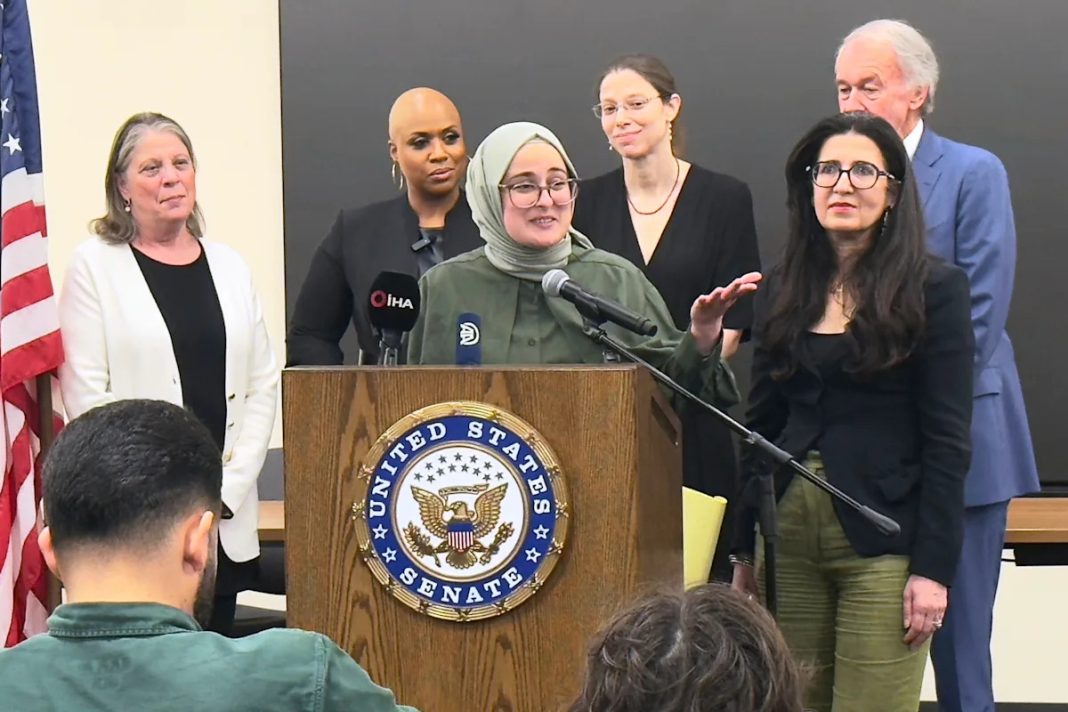Four veteran Homeland Security agents who helped execute the Trump administration’s arrests of pro-Palestinian foreign academics for deportation testified Tuesday that the orders they received were both highly unusual and described by senior officials as urgent.
“Somebody at a higher level than the people I was speaking to had an interest in him,” said agent Darren McCormack, who oversaw the arrest of recent Columbia University student Mahmoud Khalil in March.
“There were a lot of hands in the fishbowl,” recalled agent Brian Cunningham, who supervised officials involved in arresting Tufts University student Rümeysa Öztürk about two weeks later.
The agents appeared as witnesses for the government at an ongoing trial in Boston on a lawsuit claiming the Trump administration is implementing an “ideological deportation policy” that targets non-citizens in violation of the First Amendment’s free speech guarantees.
Each of the arrests discussed Tuesday took place based on determinations by Secretary of State Marco Rubio that the presence of the foreign academics in the U.S. undermined U.S. foreign policy interests. They included Khalil, Öztürk, Georgetown University researcher Badar Khan Suri and Columbia University student Mohsen Mahdawi. Subsequent to their arrests, all four were ordered released from custody by federal judges who found Rubio’s orders appeared to have violated their constitutional rights.
The agents said they couldn’t recall similar requests in the past and that, prior to President Donald Trump’s return to the White House in January, their division — Homeland Security Investigations — rarely took part in immigration enforcement.
“It was not something that I had much experience with, if any,” said Cunningham, an assistant special agent in charge in Boston. “Most of my career as an agent and as a supervisor has been in enforcement of drug laws, drug smuggling, money laundering. … That’s changed recently.”
“We had a meeting shortly after the inauguration, several meetings actually, that impressed upon us that Title 8 [immigration enforcement] was going to be prioritized,” Cunningham said, adding that deportations are typically handled by another Department of Homeland Security component, Enforcement and Removal Operations.
Cunningham said the request he received regarding Öztürk was so unusual that he contacted a Homeland Security lawyer to confirm its legality.
“I can’t recall a time that it’s come top-down like this with a visa revocation, under my purview anyway,” he said. “I did contact our legal counsel to make sure that we’re on solid legal ground….The operation kind of developed pretty quickly.”
Cunningham said that the background information he received on Öztürk included an op-ed she co-wrote in the Tufts student newspaper last year supporting divestment from Israel. The agent said he skimmed the op-ed and didn’t see anything obviously criminal in it.
“I didn’t see anything in the op-ed that suggested she’d committed a crime,” Cunningham said.
McCormack, the agent involved in Khalil’s arrest, said department leadership instructed his office to surveil Khalil and “establish a pattern of life” for his apprehension. The requests prompted McCormack to consult with William Joyce, the head of ICE’s Enforcement and Removal Operations field office in New York, which typically handles deportation-related matters.
“We historically in recent times had not enforced those laws,” said McCormack, a deputy special agent in charge in New York. “I wanted to confirm there was a legal basis for arrest.”
Asked why the usual personnel didn’t handle the arrest, which eventually took place in a hallway of Khalil’s Manhattan apartment building, McCormack was stumped.
“I’m not sure why. … I wondered why HSI was effecting this arrest and not ERO,” he said. “I still don’t know.”
The agents said the arrests followed standard procedures: They handcuffed the academics and ushered them into unmarked vehicles.
All four agents said they were never informed that the academics were being targeted for deportation due to their pro-Palestinian views, their criticism of Israel or for their political views — the central claim in the lawsuit. The agents said they carried out the arrests because the academics’ visas or green cards had been revoked and because of Rubio’s determination that their presence was at odds with U.S. foreign policy.
There was no testimony Tuesday on the basis for Rubio’s decisions. Testimony from a top State Department official who could shed light on that subject, John Armstrong, is on hold due to a temporary stay an appeals court issued in a dispute about the confidentiality of documents detailing the investigations into the academics.
The HSI agents did testify about some agents’ use of masks when making arrests, a practice that has drawn outrage from some immigrant rights advocates. They said that before the Covid pandemic masking was uncommon, although it took place occasionally when undercover agents were asked to help with more routine operations.
Now, agents mask more often out of fear of doxxing on social media, the officials said. HSI policy doesn’t require or forbid masks, they said.
“In the age of camera phones and the ability of people to identify those agents, people want to protect themselves if they’re members of this community or they live here,” Cunningham said.
Cunningham said it was “common practice” for agents to identify themselves when making an arrest and he assumes it was done when Öztürk was arrested, although he conceded he wasn’t there. “I don’t know what was said to her,” he said.
The trial, taking place before U.S. District Judge William Young without a jury, is expected to resume Thursday.

